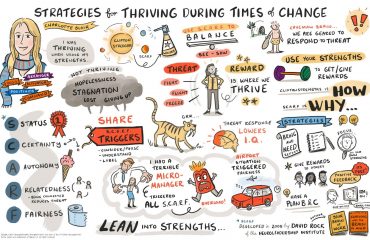
One of the most frequent comments on my school reports was, “Charlotte talks too much.” It wasn’t wrong! With my CliftonStrengths Communication theme high, I’ve always had plenty to say, and with Activator fueling me, sometimes I talk a little too fast. Add in my Positivity and the excitement often flows out of me like a waterfall. Over the years, I’ve been working on that—finding the balance between sharing my thoughts and embracing silence.
Becoming a coach 10 years ago transformed how I view silence. Through coaching and mentoring, I’ve learned to sit with silence; I try not to rush to fill the gaps and give the other person space to think and reflect.
This idea of silence in groups hit home for me recently when I attended an event. It started as we drove into the venue, I noticed five ducks sitting silently on posts by the water. The scene was simple, calm, and quiet. Later, as we shared stories, it became clear how people experience silence and noise differently. One person mentioned they think best with music in the background, while another said they find it impossible to focus unless it’s completely quiet. Something I notice in workshops.
As a strengths coach, I am aware of how unique our needs are—what energizes one person can distract another. This contrast highlights the importance of understanding each other’s preferences in teams. Something I was reminded of for myself at this event. It got me thinking about silence—how it shows up at work and in teams. What is its purpose? What does it say when it appears?
The Importance of Silence in Teams
In any workplace, silence can take on many meanings. For some, it’s a sign of deep thought. Others may use silence as a shield, staying quiet out of fear or frustration. Then there are those who thrive on quiet, needing it to process their ideas.
For example, people with strengths like Deliberative, Intellection, or Analytical may need time to think, reflect and process. These are often the ones who think deeply before speaking and often benefit from silence to fully form their ideas. Meanwhile, others, like me with Woo, Communication and Activator, might think out loud and struggle to stay quiet, sometimes not giving others time to share.
It reminds me of something my mother used to say about children: “You want to worry when they go quiet.” If a once-chatty child suddenly becomes silent, it’s time to pay attention. The same can be true in teams—when someone who was once verbal goes quiet, it’s worth considering why.
Why Do People Go Quiet?
Silence at work can have many causes. Sometimes, it’s about the person needing space to think. For example, someone with Deliberative may go quiet because they’re weighing all options. Similarly, someone with Intellection might be deep in thought, processing ideas before sharing them. Silence, in these cases, isn’t a sign of disengagement—it’s a strength being played out.
But sometimes, silence is more than thoughtfulness. Maybe someone used to speak up but has gone quiet because their contributions haven’t been heard or valued. For people with talents like Command or Self-Assurance, who naturally bring strong opinions or alternate views, silence can occur if they feel shut down too often. If their views are consistently overlooked or dismissed, they might stop contributing entirely, feeling it’s not worth the effort.
Similarly, those with Ideation and Strategic talents may offer creative solutions or visionary ideas, but if these ideas aren’t appreciated or acknowledged, they may stop sharing altogether. These individuals thrive on innovation and out-of-the-box thinking, but when their contributions fall on deaf ears, they might retreat into silence.
This can often be the start of them checking out, becoming disengaged or quiet quitting. According to Gallup, this disengagement is costly. In fact, disengaged employees cost companies an estimated 18% of their annual salary in lost productivity, absenteeism, and high turnover. When team members aren’t fully engaged, it’s not just their work that suffers—the ripple effect impacts the entire organization’s culture, innovation, and bottom line.
On the flip side, individuals with Harmony may stay quiet to avoid conflict. They are skilled at creating balance, but their silence often stems from a desire not to “rock the boat.” They prefer to maintain peace and may withhold their thoughts to prevent stirring up tension. The benefit of this strength is that they help create a harmonious environment where people feel safe and conflict is minimized. When they do speak up, it’s often to offer a solution that brings people together, making them essential for team cohesion.
Then there are those with Empathy, who may stay quiet because they can sense the unspoken emotions in the room. They often pick up on discomfort or frustration and choose not to speak, knowing that the emotional climate isn’t right for open dialogue. However, this ability to read the room is invaluable—they can guide conversations in a way that makes others feel understood and seen, often helping to surface and address unspoken concerns in a compassionate, non-confrontational way. These talents ensure that emotional undercurrents are managed with care, allowing for deeper, more meaningful connections within the team.
How Can We Better Understand and Engage with Silence?
- Create Space for Reflection: In meetings, allow time for those who need silence to gather their thoughts. This is critical for those with themes like Deliberative, Relator, and/or intelligence. Don’t mistake silence for disengagement; often, it’s the opposite.
- Encourage Input from the Quiet Ones: They often have tremendous value to contribute but either can’t get a word in edgeways or need time to think and reflect. Engaging quieter people in group conversations can be done safely with strategies inspired by Nancy Kline’s Thinking Environment, particularly focusing on Attention and Equality: Give a heads-up, let them know beforehand you’d love to hear their thoughts an a certain topic or question, ask how much time they need to think. See this blog I wrote on How to speak up when your boss says you’re TOO Quiet.
- Recognize Different Communication Styles: Understand that some people think out loud (like those with Communication) while others may need quiet to process (like Intellection). Ask them what they need to contribute at their best. Recognizing these differences can help balance discussions and ensure everyone’s voice is heard.
- Loud to Silent: If you notice someone who’s usually talkative going quiet, check in with them. What might be going on for them inside or outside of work? It could be a sign of disengagement, feeling unheard, or even personal challenges. A simple, caring conversation can help uncover the reason for their silence and show them you value their presence and contributions.
Silence Is Powerful
Silence isn’t always something to fear or fill. It can be a place of reflection, of insight, and of strength. Just as those ducks sat quietly, we can learn to embrace the silence in our work environments. Whether you’re a leader or a team member, understanding the power of silence can help you create a space where everyone feels valued—whether they speak loudly or quietly.
Who in your team has gone quiet? What might their silence be saying? Whether it’s a once-chatty Command feeling ignored or an Ideation feeling unappreciated, understanding the reasons behind the quiet can unlock incredible contributions that have been waiting in the wings.



